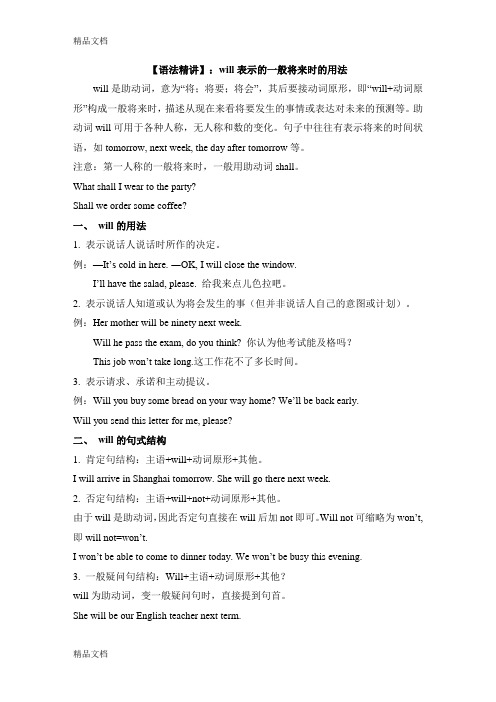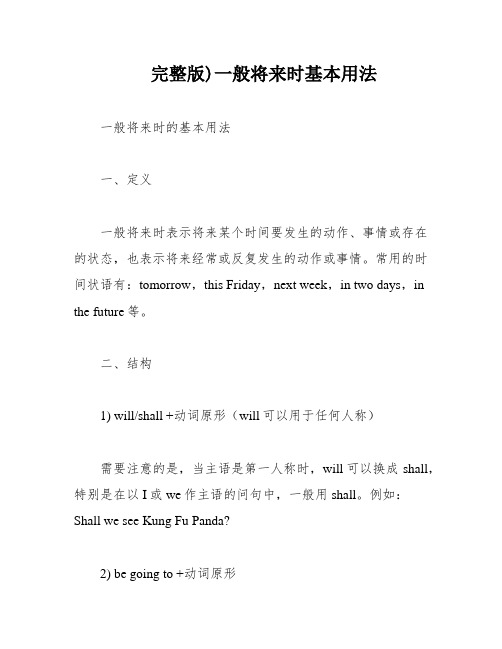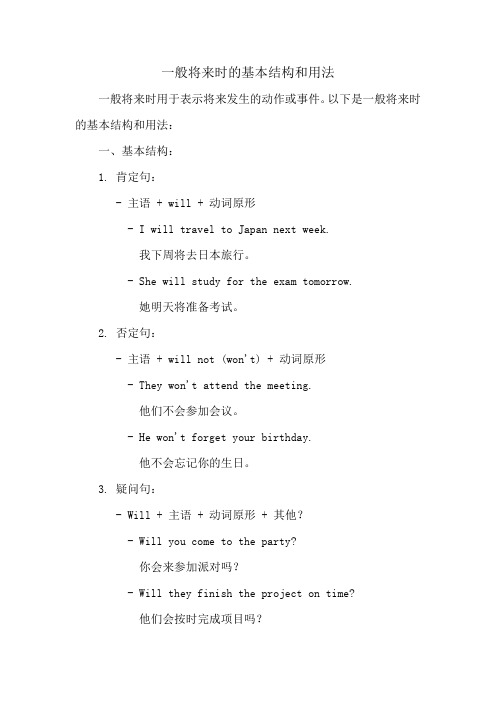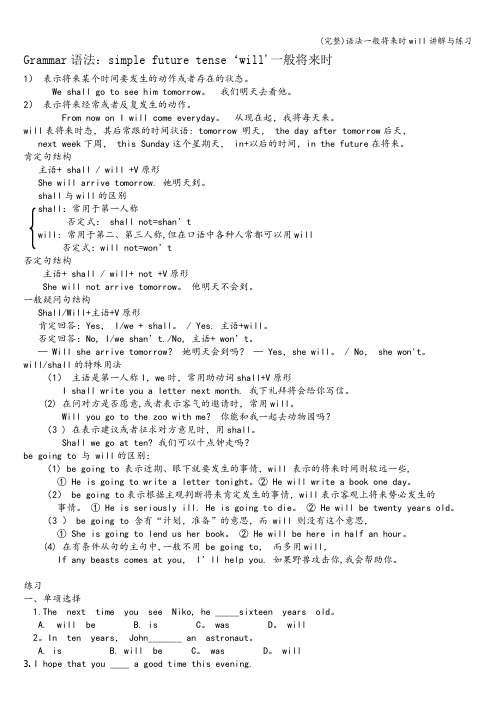(完整版)【语法精讲】:will表示的一般将来时的用法
Will一般将来时

用于表示对未来趋势或发展变化的预测和推测
用于表示对未来情况的假设和设想
用于表示对未来的预测,常与情态动词will连用
用于表示对未来可能发生的情况的推测,常与情态动词may、might、could等连用
表示未来的趋势和变化
用于表达对未来的期望和愿望
表示将来某个时间点将要发生的事情
用于描述未来的趋势和预测
在日常对话中,使用一般将来时也可以表达礼貌和委婉的语气,特别是在提出自己的观点或建议时,使用一般将来时可以让对方更容易接受自己的意见。
在写作中,使用一般将来时来表达礼貌和委婉的语气需要注意时态的准确性,避免与其他时态混淆,影响表达效果。
03
一般将来时的注意事项
注意时态的正确使用
避免混淆时态:一般将来时表示未来的动作或状态,应避免与过去时态混淆。
注意与一般现在时的区分
注意时态的一致性
注意动词时态的一致性
确保主句和从句的时态一致
注意时态的特殊用法和固定搭配
掌握时态的基本规则和变化规律
根据语境选择合适的时态
04
一般将来时的实际应用
在写作中的应用
描述未来计划或预测
描述未来的趋势或发展
表达对未来的期望或愿景
编写科幻小说或描绘未来世界
在口语中的应用
考虑语境的适应性:根据上下文和情境选择合适的表达方式,使句子更符合语境。
注意语气的恰当性:根据说话者和听众的关系、场合等因素,恰当地表达语气,使表达更自然、得体。
避免过于复杂或冗长的句子结构:尽量使用简单、明了的句子,避免让听众感到困惑或疲劳。
注意与其他时态的区分
区分一般将来时与过去将来时
避免与现在进行时混淆
疑问句:Will + 主语 + 动词原形
【语法精讲】:will表示的一般将来时的用法教学提纲

【语法精讲】:will表示的一般将来时的用法will是助动词,意为“将;将要;将会”,其后要接动词原形,即“will+动词原形”构成一般将来时,描述从现在来看将要发生的事情或表达对未来的预测等。
助动词will可用于各种人称,无人称和数的变化。
句子中往往有表示将来的时间状语,如tomorrow, next week, the day after tomorrow等。
注意:第一人称的一般将来时,一般用助动词shall。
What shall I wear to the party?Shall we order some coffee?一、will的用法1. 表示说话人说话时所作的决定。
例:—It’s cold in here. ―OK, I will close the window.I’ll have the salad, please. 给我来点儿色拉吧。
2. 表示说话人知道或认为将会发生的事(但并非说话人自己的意图或计划)。
例:Her mother will be ninety next week.Will he pass the exam, do you think? 你认为他考试能及格吗?This job won’t take long.这工作花不了多长时间。
3. 表示请求、承诺和主动提议。
例:Will you buy some bread on your way home? We’ll be back early.Will you send this letter for me, please?二、will的句式结构1. 肯定句结构:主语+will+动词原形+其他。
I will arrive in Shanghai tomorrow. She will go there next week.2. 否定句结构:主语+will+not+动词原形+其他。
由于will是助动词,因此否定句直接在will后加not即可。
(完整版)will的用法

一要注意will表示的意义和人称要求。
will表示“将来”,常用于一般将来时中,其后跟动词原形;在书面语中,主语是第一人称I / we时,常用shall.在口语中,所有人称均可用will.否定式是will not(缩略式为won’t)。
例如:He will be back in ten minu-tes. 十分钟后他将回来。
I shall/will come to see you this evening. 今晚我将来看你。
They won't go swimming again. 他们将不再去游泳。
【旁白】will 一般用于较正式的文体,而be going to多用于口语中,表示按计划、安排将要发生的事情。
例如:-Where are you going?—I’m going to buy some books。
二要注意will在there be句型中的形式及其句式变换。
由于“一般将来时”的结构可以用“will+动词原形”来表示,所以there be句型的一般将来时的形式就是there will be。
例如:There are many students in our school。
→There will be many students in our school.there will be的句式变换可以用下面的顺口溜来帮你记忆:⑴表示“将来……”很容易, there be换成there will be;⑵若是用于否定句,一定要用there won’t be;⑶要变为一般疑问句,只把will句首提;⑷遇上简答没问题, 用上there will或there won’t就可以。
例如:⑴There is some pollution in our hometown. →There will be some pollution in our hometown.⑵ There will be more cars in ten years。
一般将来时will的用法课件

6.Students will talk to their teachers on the computers.
7.Will there be schools in the future?
6.The birds won`t fly away to the south when the weather turns cold.
7.There will be a strong wind soon.
8.I will not tell it to him.
9.I think it will be very hot in Beijing next summer.
学习交流PPT
8
Functional Practise:
1.Ihope that you__ a good time this evening. C
A.have B.are having C.will have D.has
2.Look at those big black clouds. It __rain.Let`s hurry. D
No, there won`t.
8.We will use the Internet to study at home.
学习交流PPT
13
1. 明天不用上课。
2. Thewriell__b_e_ __n_o_ ____ class tomorrow. 2. 也许在100年后人们将活到200岁。
3. Ma_y_b_e__ peoplew_il_l__li_v_e__to___b_e___ 200 years old 4. in____ 100 years. 3. 许多女孩子喜欢养宠物。
一般将来时will的用法

一般将来时是一种常用的英语时态,表达的是将要发生的事情。
使用will可以表示将来时的意义。
以下是一般将来时will的用法:
1. 表示将来要发生的动作或存在的状态。
例如:“I will arrive at 6 o'clock tomorrow morning.”(我将在明天早上6点到达。
)
2. 表示一种意愿、意图或决定。
例如:“He will not come to the meeting.”(他不会参加会议。
)
3. 表示一种预测或假设。
例如:“It will rain tomorrow.”(明天会下雨。
)
4. 表示一种习惯或常规。
例如:“They will have breakfast at 7 o'clock every morning.”(他们每天早上7点吃早餐。
)
5. 表示一种委婉的建议或请求。
例如:“Would you mind closing the window, please?”(请关上窗户好吗?)
需要注意的是,一般将来时并不一定都使用will,有时也会使用其他表达方式,如be going to do、be about to do等。
同时,will 也可以与其他情态动词一起使用,如may、might、should等。
最新一般将来时课件will的用法课件ppt

Functional Practise:
1.Ihope that you__ a good time this evening. C
A.have B.are having C.will have D.has
jobs.
dull jobs.
Will he do dull Yes, he will.
jobs?
No ,he won`t.
There will be a There won`t be Will there be a Yes,there will. computer in it. a computer in it. compuer in it. No,there won`t.
一般将来时课件will的用法
我们除了用“be going to+动词原形” 可以表示一般将来时外, 我们还可以用“will+ 动词原形”来表示一般 将来时.
一般将来时的主要用法:
1、表示将来某一时刻的动作或状态: We will come to see you the day after tomorrow. There will be a wonderful show next week.
will句式总结:
肯定
否定
一般疑问 回答
I will have
I won`t have Will I have
Yes,I will.
many presents. many presents. many presents? No,I won`t.
He will do dull He won`t do
完整版)一般将来时基本用法

完整版)一般将来时基本用法一般将来时的基本用法一、定义一般将来时表示将来某个时间要发生的动作、事情或存在的状态,也表示将来经常或反复发生的动作或事情。
常用的时间状语有:tomorrow,this Friday,next week,in two days,in the future等。
二、结构1) will/shall +动词原形(will可以用于任何人称)需要注意的是,当主语是第一人称时,will可以换成shall,特别是在以I或we作主语的问句中,一般用shall。
例如:Shall we see Kung Fu Panda?2) be going to +动词原形例如:I’m going to play the piano。
be going to和will的区别be going to和will的用法虽然都表示将来发生动作或情况,一般情况下能互换。
但它们的用法是有区别的。
be going to主要用于:1、表示事先经过考虑、安排好打算、计划要做的事情。
例如:Dad and I are going to watch an opera this afternoon.2、表示根据目前某种迹象判断,某事非常有可能发生。
例如:Look。
There come the dark clouds。
It is going to rain.三、一般疑问句和否定句一般疑问句:1) will/shall +动词原形(will可以用于任何人称)——在will后加not2) be going to +动词原形——在be后加not例如:She will come back in three days.Will she not come back in three days?They are going to clean their classroom.Are they not going to clean their classroom?否定句:1) will/shall +动词原形(will可以用于任何人称)——将will提前2) be going to +动词原形——将be提前例如:She will come back in three days.She will not come back in three days.Will she come back in three days?XXX is whether they will actually do it。
(完整版)一般将来完成时的用法详解

(完整版)一般将来完成时的用法详解一般将来完成时的用法详解
一般将来完成时是英语中的一种时态,用于表示将来某个时间点之前已经完成的动作或情况。
下面将详细介绍一般将来完成时的用法。
构成
一般将来完成时由将来时态的助动词 "will" 或 "shall"、"have" 和动词的过去分词构成。
肯定句结构:
主语 + will/shall + have + 过去分词
否定句结构:
主语 + will/shall + not + have + 过去分词
疑问句结构:
Will/Shall + 主语 + have + 过去分词 + 其他?
用法
一般将来完成时主要用于以下几种情况:
1. 表示将来某个时间点之前已经完成的动作或情况。
- I will have finished my homework by the time you arrive.
- By tomorrow, they will have already left for their trip.
2. 表示对未来某个时间点的预测。
3. 表示对过去某个时间点的未来完成的猜测。
- He will have passed the exam yesterday.
注意事项
1. 一般将来完成时通常用于将来时间点之前的动作或情况,因此在句子中应明确指出相关的时间点。
2. 一般将来完成时也可以与其他将来时态连用,如将来进行时、将来完成进行时等,以表达更复杂的时间关系和语义。
希望以上解释对您有所帮助。
如果您有任何疑问,请随时向我
提问。
一般将来时will的用法

8. 明天的天气会是怎样? will the be like What ____ ___ weather ______ ___ ____ tomorrow? 9. 有一天我将会和好朋友乘火箭到月球度假。 rocket to the for vacation ___ with One day I will fly ___ ____ ___ ___ moon ____ ___ my friends. 10. 我帮妈妈做家务。 helpmy mother ____ withhousework. I ___ 11. 科学家尝试让机器人做同样的事情。 to make Scientists try ____ ___ ____ robots do the same ____ thingsas ___ human(人).
例句
1.I will call you this evening. 2.Students will use computers to learn in the future. 3.He will help his sister with her lessons. 4.We won`t be free(空闲的) this afternoon. 5.She will not listen to me. 6.The birds won`t fly away to the south when the weather turns cold. 7.There will be a strong wind soon. 8.I will not tell it to him.
汉译英: 1.明天,我们学校将有场足球赛,我准备去看. 2.我打算和李明一起复习功课. 3.将来每个人都有一台计算机. 4.美美正在做饭.今天晚上她要把饭带到晚会上去. 5.我理想的学校将有宽大的教室和图书室. 6.学生将在电脑上与老师对话. 7.将来有学校吗?不,没有 8.我们将使用因特网在家里学习.
一般将来时will的用法

用will表示承诺和要求
Will也常用来表示承诺和要求。它可以表达你对某件事的承诺,或者向他人提 出请求。例如: I will finish the report by tomorrow. Will you please pass me the salt?
用will表示预测和推测
Will还可以用来表示预测和推测。它可以表达对未来情况的猜测或预测。例如:
用will表示安排和计划
Will也常用来表示安排和计划。它可以表达你将要做某事,并已经安排好了。例如: I will meet you at the airport tomorrow. They will have a meeting at 3 PM.
用will表示习惯和经验
Will还可以用来表示习惯和经验。尽管它是将来时,但在这种情况下表示的是 过去经常发生的动作或情况。例如: When I was young, I will go swimming every weekend. He will always eat lunch at his desk.
在口语中使用will时,有一些常见错误要避免。例如: 错误:I will g o to the park tom orrow. (不要用will来表示明确的计划或安 排。) 正确:I'm g oing to the park tom o rrow.
常见的缩略形式
在口语中,will有一些常见的缩略形式。例如: I'll go to the store later. She won't be able to come tomorrow.
肯定句的构成
在一般将来时的肯定句中,主语后面跟上will动词,然后是动词的原形。例如: I will study for the exam. He will travel to Europe next month.
一般将来时will

英语初一专题一般将来时 -will知识点精讲透析Will 是助动词,意为“将;将要;将会” ,其后要接动词原形,即”will+ 动词原形”构成一般将来时,描述从现在来看将要发生的事情或表达对未来的预测等。
助动词will 可用于各种人称,无人称和数的变化。
句子中往往有表示将来的时间状语,如tomorrow ,next week, the day after tomorrow 等。
注意:第一人称的一般将来时,一般用助动词shall.What shall I wear to the party? Shall we order some coffee?一、will 的用法1. 表示说话人说话时所作的决定。
例:—“It 's cold in here. ”—“OK,I will close the window. ”I 'll have the salad, please. 给我来点儿色拉吧。
2. 表示说话人知道或认为将会发生的事(但并非说话人自己的意图或计划)。
例:Her mother will be ninety next week.Will he pass the exam,do you think? 你认为他考试能及格吗?This job won 't take long. 这工作花不了多长时间。
3. 表示请求、承诺和主动提议。
例:Will you buy some bread on your way home?We 'llbe back early.Will you send this letter for me,please?二、will 的句式结构1. 肯定句结构:主语+will+ 动词原形+ 其他。
I will arrive in Shanghai tomorrow.She will go there next week.2. 否定句结构:主语+will+not+ 动词原形+ 其他。
一般将来时的基本结构和用法

一般将来时的基本结构和用法
一般将来时用于表示将来发生的动作或事件。
以下是一般将来时的基本结构和用法:
一、基本结构:
1. 肯定句:
- 主语 + will + 动词原形
- I will travel to Japan next week.
我下周将去日本旅行。
- She will study for the exam tomorrow.
她明天将准备考试。
2. 否定句:
- 主语 + will not (won't) + 动词原形
- They won't attend the meeting.
他们不会参加会议。
- He won't forget your birthday.
他不会忘记你的生日。
3. 疑问句:
- Will + 主语 + 动词原形 + 其他?
- Will you come to the party?
你会来参加派对吗?
- Will they finish the project on time?
他们会按时完成项目吗?
二、用法:
- 表示将来发生的动作或事件。
- 表示预测、承诺、意图、计划等将来的行为或状态。
- 通常与表示将来时间的时间状语连用,如 tomorrow, next week, in the future 等。
值得注意的是,一般将来时通常用于与将来相关的动作和事件,而对于已经计划或安排好的未来事件,可以使用 "be going to" 结构。
一般将来时课件will的用法 (3)

用所给词的适当形式填空: be 1.There Will ______(be )an American film next week. Will finish 2.They __ ___ (finish)the work this afternoon. Will play 3.Tom__ ____ (play) football with us tomorrow? Will do 4.Robots__ _____(do) lots of work in our homes in the future. Will be 5.There__ ____(be)strong winds tonight. Will forget 6.Before long,he__ ___(forget)all about the matter. Will be___(be)back in three hours. 7.He__ Will send 8.We__ __(send)for a doctor if you are __ (be)not better in the evening.
What will your dream school have ?
肯定句:主语+ will +动词原形+(宾语)+其
Some day people will go to the moon . 否定句:在will 的后面加not即可。 will not 可缩写为 won’t They won’t use books . 一般疑问句:把will 提到句子主语之前,结尾变问号。 Will students go to school in the future ?
(完整)语法一般将来时will讲解与练习

Grammar语法:simple future tense‘will'一般将来时1)表示将来某个时间要发生的动作或者存在的状态。
We shall go to see him tomorrow。
我们明天去看他。
2)表示将来经常或者反复发生的动作。
From now on I will come everyday。
从现在起,我将每天来。
will表将来时态,其后常跟的时间状语: tomorrow 明天, the day after tomorrow后天,next week下周, this Sunday这个星期天, in+以后的时间,in the future在将来。
肯定句结构主语+ shall / will +V原形She will arrive tomorrow. 她明天到。
shall与will的区别shall:常用于第一人称否定式:shall not=shan’twill: 常用于第二、第三人称,但在口语中各种人常都可以用will否定式:will not=won’t否定句结构主语+ shall / will+ not +V原形She will not arrive tomorrow。
他明天不会到。
一般疑问句结构Shall/Will+主语+V原形肯定回答:Yes, I/we + shall。
/ Yes. 主语+will。
否定回答:No, I/we shan’t./No, 主语+ won’t。
— Will she arrive tomorrow?她明天会到吗?— Yes,she will。
/ No, she won't。
will/shall的特殊用法(1)主语是第一人称I,we时,常用助动词shall+V原形I shall write you a letter next month. 我下礼拜将会给你写信。
(2) 在问对方是否愿意,或者表示客气的邀请时,常用will。
Will you go to the zoo with me?你能和我一起去动物园吗?(3 ) 在表示建议或者征求对方意见时,用shall。
will的用法归纳

will的用法归纳关键信息项:1、 will 作为助动词表示将来时态一般将来时的构成时间状语的搭配2、 will 表示意愿、决心表达个人意愿强调决心3、 will 用于预测、推测基于现有情况的预测没有确切依据的推测4、 will 用于请求、邀请礼貌的请求正式的邀请5、 will 表示习惯、倾向描述经常发生的动作或状态与频率副词的搭配6、 will 用于“主将从现”原则条件状语从句中的应用时间状语从句中的应用11 will 作为助动词表示将来时态111 一般将来时的构成“will +动词原形”构成一般将来时,表示将来某个时间要发生的动作或存在的状态。
例如:“I will go to Beijing next week”(我下周将去北京。
)“They will have a party tomorrow”(他们明天将举办一个派对。
)112 时间状语的搭配与一般将来时常用的时间状语有:tomorrow(明天)、next week /month / year(下周/下个月/明年)、in the future(在未来)、soon(不久)等。
例如:“She will come back soon”(她不久就会回来。
)“We will meet again next year”(我们明年会再见面。
)12 will 表示意愿、决心121 表达个人意愿当 will 用于表达个人意愿时,强调主语想要做某事的主观想法。
例如:“I will help you if you need”(如果你需要,我愿意帮助你。
)“He will not give up easily”(他不会轻易放弃。
)122 强调决心Will 还可以用来强调决心,表示坚决要做某事。
例如:“I will succeed no matter what”(无论怎样我都会成功。
)“They will finish the project on time”(他们决心按时完成项目。
一般将来时课件will的用法

Will be no
maybe
in
will
live
to
be
petting
Will
there
be
more
fewer
less
do you think
will be
will the weather be like fly rocket to the moon for with
help try
with to make same as
The end
Thank you!
The Simple Future Tense
一般将来时
我们除了用“be
going to+动词原形”可以 表示一般将来时外,我们还可以用“will+动 词原形”来表示一般将来时.
will 引导的一般将来时:表示将来发生的动作
或存在的状态,最基本的结构:will + 动词 原形
“主谓(宾)句型”的一般将来时:
There won`t be Will there be a a computer in it. computer in it. They won`t do heavy work. Will they do heavy work?
一般将来时两种基本句式的区别的
在初中阶段来讲,”be
going to+动词原形” 和“will+动词原形”这两种表示将来时态的 结构没什么区别。但在现代英语中,特别是 在口语中,表示将来时多用“be going to+动 词原形”这一形式。另外他们主要区别在于 “be going to+动词原形”表示一个事先考虑 好的意图,相当于“打算、计划、准备”, 而will则表示未经事先考虑的意图。在
Will一般将来时ppt课件

一般将来时表示将来发生的动作或存在的状态 助动词shall/will + 动词原形(当主语第一人称时, 一般用shall,shall用于第一人称,常被will 所代 替。)
肯定式: 主语+shall/will+动词原形+其他 否定式: 主语+shall/will+not+动词原形+其他. 疑问式: Shall/Will+主语+动词原形+其他 简略回答: (肯) Yes,主语+shall/will .
I feel ill now, and I'll go to see the doctor. I'm going to see the doctor this evening.
He is studying hard and is going to try for the exams. 他 正努力学习,准备参加考试。(不能用will替换)
----What are you going to do this evening? ----I’m going to see a film.
You will be forty years old next year. Tomorrow will be Sunday again.
2. be going to+动词原形可表示事先计划的意图,而 will 则表示说话人当时决定的意图; We're going to drive you home after the meeting. Don't call a taxi. We'll drive you home.
(三)、现在进行时
表示位置转移的动词常与现在进行时和表示将来的 时间状语连用,表示在最近将要发生某事。这些事是 事先安排好的。例如:
- 1、下载文档前请自行甄别文档内容的完整性,平台不提供额外的编辑、内容补充、找答案等附加服务。
- 2、"仅部分预览"的文档,不可在线预览部分如存在完整性等问题,可反馈申请退款(可完整预览的文档不适用该条件!)。
- 3、如文档侵犯您的权益,请联系客服反馈,我们会尽快为您处理(人工客服工作时间:9:00-18:30)。
【语法精讲】:will表示的一般将来时的用法
will是助动词,意为“将;将要;将会”,其后要接动词原形,即“will+动词原形”构成一般将来时,描述从现在来看将要发生的事情或表达对未来的预测等。
助动词will可用于各种人称,无人称和数的变化。
句子中往往有表示将来的时间状语,如tomorrow, next week, the day after tomorrow 等。
注意:第一人称的一般将来时,一般用助动词shall。
What shall I wear to the party?
Shall we order some coffee?
一、will的用法
1. 表示说话人说话时所作的决定。
例:—It’s cold in here. ―OK, I will close the window.
I’ll have the salad, please. 给我来点儿色拉吧。
2. 表示说话人知道或认为将会发生的事(但并非说话人自己的意图或计划)。
例:Her mother will be ninety next week.
Will he pass the exam, do you think? 你认为他考试能及格吗?
This job won’t take long.这工作花不了多长时间。
3. 表示请求、承诺和主动提议。
例:Will you buy some bread on your way home? We’ll be back early.
Will you send this letter for me, please?
二、will的句式结构
1. 肯定句结构:主语+will+动词原形+其他。
I will arrive in Shanghai tomorrow. She will go there next week.
2. 否定句结构:主语+will+not+动词原形+其他。
由于will是助动词,因此否定句直接在will后加not即可。
Will not可缩略为won’t,即will not=won’t.
I won’t be able to come to dinner today. We won’t be busy this evening.
3. 一般疑问句结构:Will+主语+动词原形+其他?
will为助动词,变一般疑问句时,直接提到句首。
She will be our English teacher next term.
一般疑问句:Will she be your English teacher next term?
I will be a middle school student next year.
一般疑问句:Will you be a middle school student next year?
4. 特殊疑问句结构:疑问词(组)+will+主语+动词原形+其他?
What will the future be like? How will you finish your work?
I will arrive in Shanghai next week. (对划线部分提问)
对Shanghai提问:Where will you arrive in next week?
对next week提问:When will you arrive in Shanghai?
课后练习:
中考链接:
1.—Which team do you think ________ the game?
—Hard to say. There are still ten minutes before it ends.
A.won
B. has won
C. will win
D. wins
2. This term _______over. The summer vacation is coming in two weeks.
A. is
B. was
C. has been
D. will be 巩固练习
用括号内的时间状语改写句子。
1. I visit my grandparents.(next weekend)
______________________________________________
2. Does she speak English at the meeting?(tomorrow)
______________________________________________。
